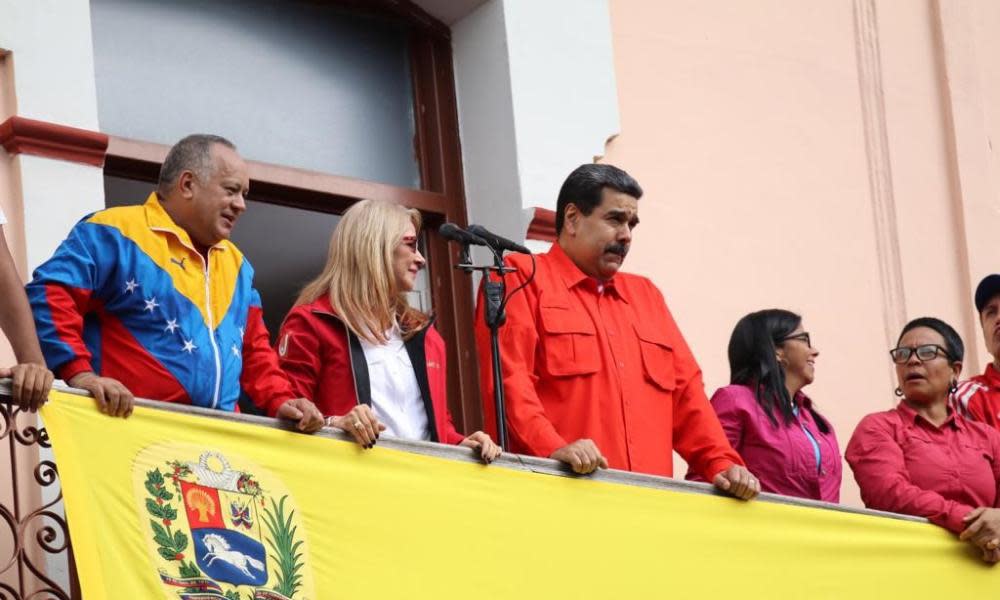Venezuela crisis: what happens now after two men have claimed to be president?

Venezuela’s political crisis was turned on its head on Wednesday as a succession of world powers declared they were recognizing the opposition leader Juan Guaidó as the South American country’s rightful interim president.
“The citizens of Venezuela have suffered for too long at the hands of the illegitimate Maduro regime,” Donald Trump tweeted as he announced what some believe could prove a game-changing decision.
Soon after, Canada, Brazil, Colombia, Chile, Peru, Ecuador, Argentina, Paraguay and Costa Rica said they would follow suit – although Mexico’s left-leaning government said there would be no change of policy for now and Bolivia’s president, Evo Morales, attacked what he called an imperialist assault on South America’s right to democracy and self-determination.
“Brazil will politically and economically support the transition process so that democracy and social peace return to Venezuela,” tweeted Brazil’s far-right president, Jair Bolsonaro.
A senior US administration official said the move meant “Maduro and his cronies” now needed to understand they had no future and had no choice but to accept “a peaceful transition” and “an exit solution” from the country.
But as the dramatic news sunk in, Venezuela specialists said they were unsure what the immediate impact might be – and how Maduro might react.
Eric Farnsworth, a former US diplomat and vice-president of the Council of the Americas, said Guaidó’s move – and Trump’s swift recognition – which came on a day of rare mass protests in Venezuela – was “a clear inflection point” that could prove the tipping point for Maduro’s embattled regime.
“I don’t think we can automatically assume he is on the way out. But I do think today is the most serious threat he has faced,” said Farnsworth.
Yet it was also a moment fraught with danger, both for the regime and the country. “Maduro can’t acquiesce to this shift – he is going to have to react in some way,” Farnsworth predicted.
Maduro wasted no time in launching his counter-attack. From the presidential palace’s “people’s balcony” he announced he was breaking diplomatic relations with the US and gave US diplomatic personnel 72 hours to leave the country.
Maduro claimed an attempted coup backed by the “gringo empire” was under way and urged supporters – and crucially the armed forces – to resist it “at all costs”.
“We are defending the right to the very existence of our Bolivarian Republic,” Maduro said, accusing his foes of trying to steal Venezuela’s oil, gas and gold: “They intend to govern Venezuela from Washington. Do you want a puppet government controlled by Washington?”

Beyond breaking ties with the US, many now expect Maduro to order the arrest of Guaidó or other opposition leaders. Farnsworth said Maduro might also “turn sharpshooters on crowds and try to scare everybody back home”.
If that happened, the US and the international community would be forced to react. The US official said it had “a host of options” if such a crackdown occurred: “Everything is on the table – all options.”
Ratcheting up oil sanctions in an attempt to economically strangle Maduro’s regime would be the most likely step, with the official warning “we haven’t even scratched the surface” with sanctions.
But David Smilde, a Venezuela expert from the Washington Office on Latin America advocacy group, said the US in fact had few good options were Maduro to respond with violence or political repression.
“The US and other countries have really upped the ante … but it’s not clear that it breaks new ground,” he said.
Increased economic sanctions could exacerbate an already severe humanitarian emergency that the UN says has created the biggest migration crisis in recent Latin American history. A military intervention that would potentially lead to massive destruction and great loss of life and could drag the US into a messy and protracted occupation and reconstruction process was also undesirable.
Smilde said: “Look at Somalia, look at Afghanistan, look at Iraq: all of those cases were supposed to be short military actions and actually what they do is end up generating enormous costs in terms of loss of life and infrastructure.”
The US official said Trump hoped Maduro and those around him would understand they now had no “immediate future” and had to seek a peaceful exit route that would see democracy restored to Venezuela.
“Let’s remain optimistic and hope Maduro and his cronies saw the magnitude of the message [from today’s protests],” he said.
Farnsworth said he saw turbulence ahead and warned of a possible breakdown of civil authority and “chaos on the ground”.
“This is going to be a very important date which portends some very volatile and uncertain days and weeks ahead,” he predicted. “There is no question in my mind about that.”

 Yahoo News
Yahoo News 
